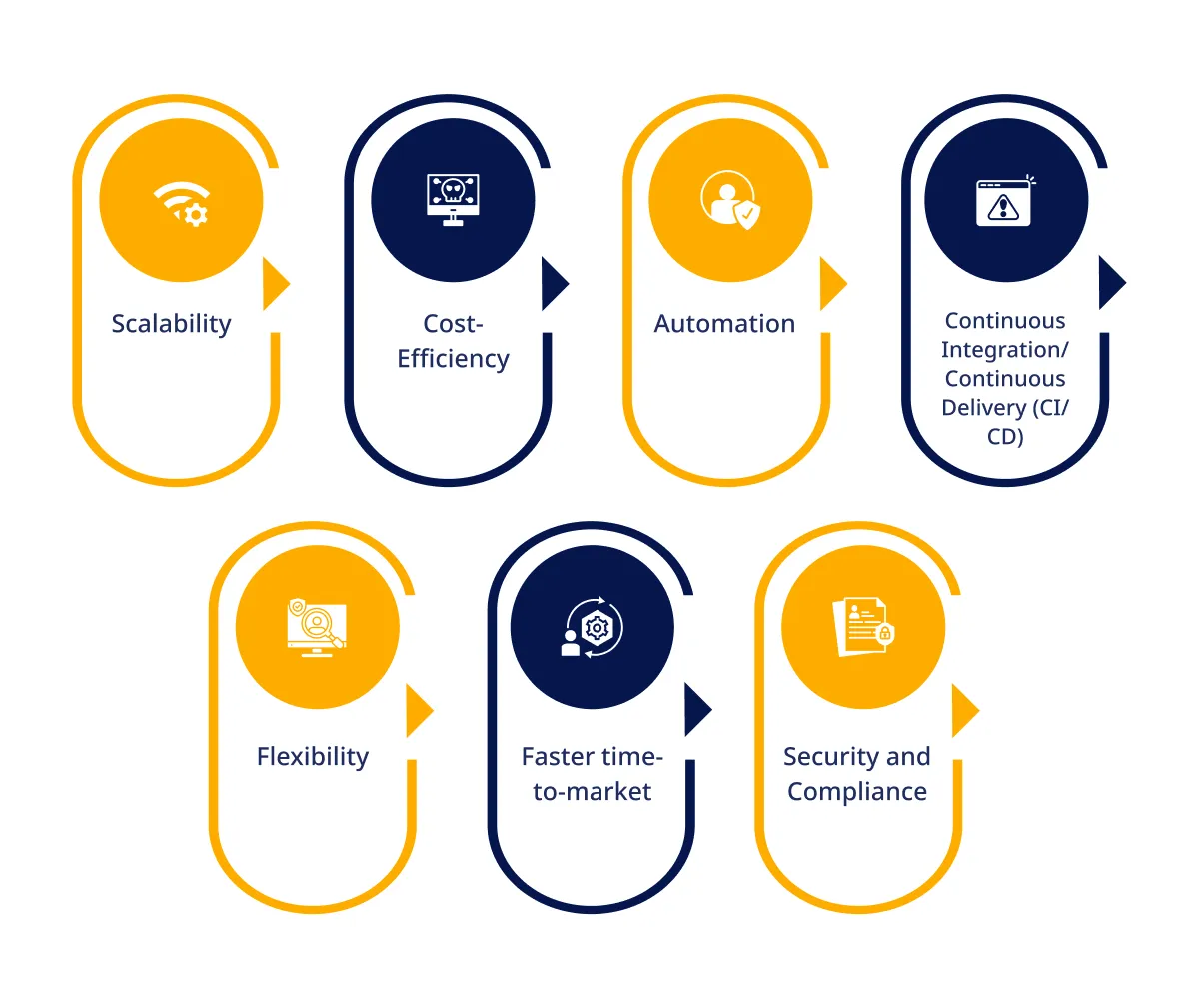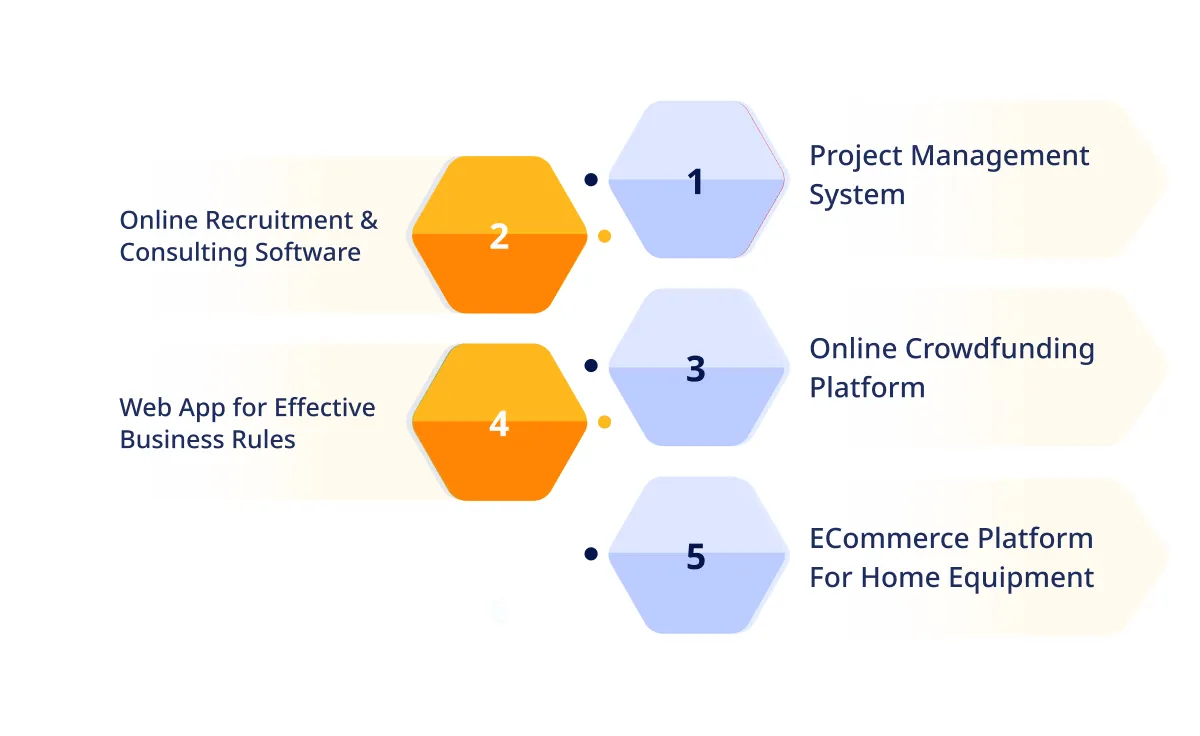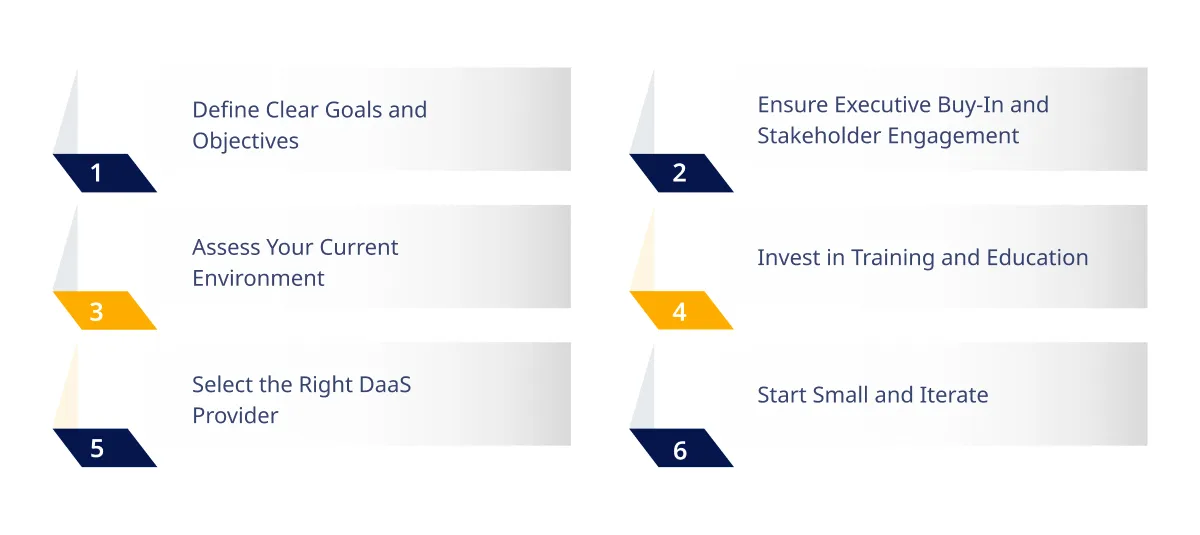Efficient software deployment is critical for businesses to stay competitive in today’s rapidly evolving digital world. DevOps as a Service (DaaS) is a paradigm-shifting approach to software deployment that is revolutionizing the industry.
DevOps as a Service provides a comprehensive solution to the complexities of traditional software deployment methods. But what exactly is DaaS, and how does it differ from conventional DevOps practices? That we’ll discuss in this blog post, starting from the fundamentals of DaaS, its key features, and the tangible benefits it brings to businesses of all sizes.
Whether you’re a startup looking to streamline your development processes or an enterprise seeking to scale your operations, DaaS holds the potential to drive innovation and efficiency in your organization.
At ValueCoders, we understand what organizations face when managing their DevOps infrastructure and streamlining their deployment processes. Discover the game-changing potential of DaaS in our newest blog post.
Ready to embrace the future of software deployment with DevOps as a Service? Let’s explore together.
Understanding DevOps as a Service
DevOps as a Service (DaaS) is a modern approach to software development and deployment that facilitates the entire process, from code development to production deployment. At its core, DaaS integrates the principles of DevOps and cloud computing technologies to provide a comprehensive solution for organizations of all sizes.
Unlike traditional DevOps practices, which often require significant investment in infrastructure and expertise, DaaS offers a more accessible and cost-effective alternative.
By leveraging cloud-based platforms and deployment automation tools, DaaS providers enable businesses to offload the burden of managing their DevOps infrastructure while still reaping the advantages of continuous integration, continuous delivery, and automated testing.
In essence, DevOps as a Service shows a paradigm transition in how organizations approach software development and deployment.
By outsourcing the management of their DevOps infrastructure to specialized DevOps consulting companies, businesses can unlock new levels of efficiency, agility, and innovation in their software delivery practices.
Let ValueCoders' DevOps as a Service streamline your software deployment journey.
The Evolution of Software Deployment
Software deployment has evolved a lot over time with new technological advancements and changing business needs.
-
Manual deployment
In the early days of computing, software deployment was a manual process. IT teams were needed to install applications individually on each machine.
-
Script-based installations
As technology improved, people started using scripts and special tools to help install software. This made things a bit easier because some tasks were automated, but they still required a lot of manual work from people.
-
Virtualization and cloud computing
With the beginning of virtualization and cloud computing, companies could separate the hardware from the software and get resources whenever they needed them. This made it simpler to expand programs and put them in different places.
-
DevOps
The growth of DevOps changed how software gets released by focusing on teamwork, automation, and continuous integration and delivery (CI/CD). DevOps brought developers and operations teams together, making it easier to release software quickly and reliably.
-
Containerization and orchestration
The rise of containerization software deployment tools such as Docker and orchestration platforms like Kubernetes made software deployment even easier and more consistent. Containers wrap up applications and everything they need to run into tidy packages that can be moved around easily. Meanwhile, orchestration platforms handle the management of these containerized applications, making deployment simpler.
In the future, we expect software deployment to change as companies start using new technologies like serverless computing and edge computing.
These technologies will make deploying software even easier and allow for new possibilities, like bringing applications closer to the people who use them to make them faster.
With ValueCoders' DevOps as a Service, achieve faster software releases.
In general, the changes in software deployment show a bigger shift towards using more automation, being flexible, and coming up with new ideas in how we make software.
DevOps as a Service: Key Features and Benefits
DevOps as a Service (DaaS) comes with many useful features and advantages for companies aiming to make their software development and deployment smoother.
Here’s a look at some of the main ones:
-
Scalability
DaaS platforms can adjust to your organization’s needs smoothly. Whether you’re a small startup or a large enterprise, DaaS lets you expand your development and deployment as needed, without having to spend a lot upfront on infrastructure.
-
Cost-Efficiency
When you let a specialized provider handle your DevOps infrastructure, you can save a lot on costs like buying hardware, maintaining it, and getting software licenses. DaaS providers usually have a pay-as-you-go system, so you only pay for what you actually use.
-
Automation
DaaS platforms take care of repeating tasks and workflows, like putting code into action, checking it, and watching over it. This saves time and makes mistakes less likely. With automation, software gets released quicker and more reliably, making work more efficient and productive.
-
Continuous Integration/Continuous Delivery (CI/CD)
DaaS makes it easier for companies to use CI/CD practices, where they automate how they put changes into their code, check them, and make them available for use. This helps them get their products out faster, shorten the time it takes to make them and release updates more often.
Also Read: Understanding the Difference Between DevOps and DevSecOps
-
Flexibility
DaaS platforms give you choices when it comes to open-source DevOps tools, technologies, and how you deploy your software. Whether you like using free tools like Jenkins and Ansible or paid ones like GitLab and AWS CodePipeline, DaaS providers can adjust to what you like and what you need for your projects.
-
Faster time-to-market
With DaaS, companies can speed up the time it takes to bring their products to market by smoothing the software delivery process and reducing the time it takes to release new versions. By automating tasks like making, checking, and releasing applications, DaaS helps teams release new features and updates more often, giving them an advantage in fast-changing markets.
-
Security and Compliance
DaaS providers follow strong security rules and meet government requirements to keep your data and apps safe and available. They use top-notch security methods and check regularly to make sure everything stays secure. This helps lower the chances of security problems and makes sure they follow the rules.
In general, DevOps as a Service is a complete answer for companies wanting to update how they make and release software. With its ability to grow, save money, automate tasks, and adapt to different needs, DaaS helps businesses come up with new ideas faster, work together better, and give customers what they need more quickly than ever.
Partner with ValueCoders to implement DevOps as a Service and drive innovation in software deployment.
Case Studies and Success Stories
Let’s take a closer look at how DevOps as a Service (DaaS) has transformed software development and deployment for businesses across various industries.
Through real-world case studies and success stories, we’ll explore the tangible benefits and innovative solutions enabled by DaaS. These examples showcase the flexibility and effectiveness of DaaS in addressing diverse business needs and driving positive outcomes.
-
A Project Management System
ValueCoders developed a comprehensive project management system for businesses offering professional services. Leveraging DevOps as a Service, the solution streamlined the entire project lifecycle, from proposal to final delivery and invoicing. With a user-friendly web interface, all stakeholders could easily understand their roles and contributions, fostering collaboration and efficiency across the organization.
-
Online Recruitment & Consulting Software
By employing DevOps as a Service, ValueCoders crafted an intuitive recruitment platform, empowering organizations to manage their recruitment processes seamlessly. The platform featured a simple user interface for setting up new users, jobs, and recruitment processes. With streamlined workflows and customizable templates, recruiters could collaborate effortlessly, track progress, and make informed hiring decisions.
-
Online Crowdfunding Platform
ValueCoders implemented DevOps as a Service to build a blockchain-based crowdfunding platform, enabling fundraisers to create and manage fundraising projects efficiently. With features like project categorization and payment customization, fundraisers could easily engage with investors and track donations. The platform facilitated transparency and trust, empowering fundraisers to achieve their fundraising goals effectively.
-
Web App for Effective Business Rules
Leveraging DevOps as a Service, ValueCoders developed a web application for categorizing and classifying vehicles using advanced technologies like ELASTIC SEARCH. The application introduced innovative features like mapping V2 and asset classification, allowing users to define rules and generate accurate results. With a focus on efficiency and accuracy, the web app revolutionized business rules management.
Also Read: How DevOps Fuels Innovation and Propels Growth for Enterprises
-
ECommerce Platform For Home Equipment
ValueCoders utilized DevOps as a Service to create a multilingual e-commerce platform catering to the house construction industry in the Middle East. With features like product analysis, guest and registered user access, and flexible payment options, the platform offered a seamless shopping experience. By integrating DevOps practices, ValueCoders ensured scalability, reliability, and performance, driving success for the e-commerce platform.
These case studies show how DevOps as a Service can completely change how companies release software, making it easier for them to reach their goals. At ValueCoders, we promise to provide customized DaaS solutions that help our clients find new chances and succeed in today’s digital world.
Discover the transformative potential of DevOps as a Service.
Best Practices for Implementing DaaS
Using DevOps as a Service (DaaS) can make a big difference for companies wanting to make their software development and release smoother.
To make sure it works well, it’s important to follow some good ways of doing things that make the most of DaaS while making any problems smaller.
Here are some best practices for implementing DaaS effectively:
1. Define Clear Goals and Objectives
Before you start using DaaS, make sure you know what your company wants to achieve. Figure out where DaaS can help, like making it quicker to release software, being able to grow easily, or spending less money on operations. When you know what you’re aiming for, you can make sure that using DaaS fits in with what your company wants to do.
2. Assess Your Current Environment
Check everything about how you’re doing DevOps now, like what monitoring tools in DevOps you’re using, how you’re doing things, and what your team can do. See if there are any problems or places where things could work better that DaaS could help with. Also, look at what you’re already doing well that you can use with DaaS. This check will help you make a plan for using DaaS that fits what your company needs.
3. Select the Right DaaS Provider
Pick a DaaS provider that matches up with what your company wants to achieve, needs, and how much you can spend. Think about things like how good the provider has been before, what they know about, how safe they keep things, if they can grow with your company, and what kind of help they offer. Find DevOps consulting firms that have pricing options that work for you and can make things just the way you need them.
4. Ensure Executive Buy-In and Stakeholder Engagement
Secure buy-in from key stakeholders, including executives, IT leaders, and development teams, early in the DaaS implementation process. Ensure that everyone understands the benefits of DaaS and their role in the implementation process. Promote open communication and collaboration to ensure a smooth transition to DaaS.
5. Invest in Training and Education
Provide training and education for your teams to make sure they have the necessary skills and knowledge to use DaaS effectively. Offer workshops, online resources, and seminars to help team members understand DaaS concepts, tools, and best practices. Facilitate continuous learning and skill development to keep pace with evolving DaaS technologies.
6. Start Small and Iterate
Begin your DaaS execution with small, manageable projects or trial initiatives before scaling up to larger deployments. This approach allows you to test how well DaaS works, find any problems, and make changes to your implementation strategy based on feedback and lessons learned. Gradually expand the scope of your DaaS implementation as you gain confidence and experience.
Continuously monitor the performance of your DaaS implementation and gather real user feedback to identify areas for improvement. Use key performance indicators and metrics to track the impact of DaaS on deployment speed, reliability, and cost savings. Check regularly to make sure how you use DaaS is as good as it can be by changing things to make them work even better.
By following these best practices, organizations get the most out of DevOps as a Service and effectively reach their goals for software development and deployment.
With careful planning, stakeholder engagement, and continuous improvement, DaaS can be more creative, flexible, and competitive in today’s digital world.
Trust ValueCoders to handle your DevOps needs and revolutionize your deployment practices.
Parting Thoughts!
DevOps as a Service (DaaS) is revolutionizing software deployment, offering organizations a scalable, efficient, and cost-effective solution for their DevOps needs.
By integrating cloud-based technologies, automation, and collaboration, DaaS enables businesses to accelerate their time to market, improve scalability, and reduce operational costs.
The highlighted case studies and success stories showcase the substantial benefits and transformative impact of DaaS across various industries, from project management to crowdfunding and e-commerce.
At ValueCoders, we’re committed to enabling organizations with innovative DaaS solutions tailored to their specific needs and objectives.
Whether you’re a startup seeking agility or an enterprise seeking to optimize your software deployment processes, DaaS holds the key to harnessing new levels of efficiency and competitiveness in today’s digital world.
Ready for a journey towards smooth software deployment with DevOps as a Service? Reach out to us today and discover how ValueCoders, a DevOps services company, can help you redefine your DevOps practices and drive success in the digital age.
Contact us now to explore our DevOps as a Service and proceed on your path toward seamless software deployment!











